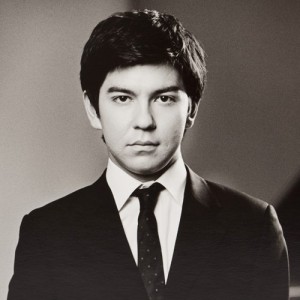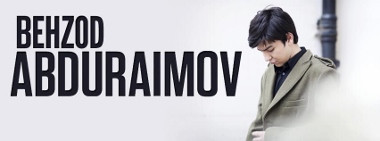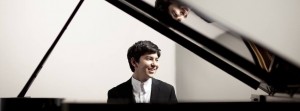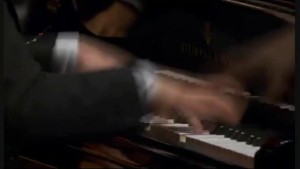ABDURAIMOV TRIUMPHS IN DISNEY HALL DEBUT
 In the past five years, I have encountered only a handful of fresh-to-the-scene soloists who completely enraptured’”those who combine the old-school magnetic quality of superlative technique with energetic experimentation, soul, and discovery. Among the electrifying performers that have made me literally lean forward in my seat are cellist Alisa Weilerstein, pianist Daniil Trifonov, and violinist Augustin Hadelich. Last Saturday, another magnificent player has safely joined that list: Behzod Abduraimov. This Uzbek pianist was born in Tashkent in 1990 just before the collapse of the Soviet Union, and he brings a sense of his own personal reformation combined with the majesty and power of the classical Russian spirit. The stars are aligned for this exciting presence to appear in the firmament: He made his Hollywood Bowl debut earlier this year replacing Yefim Bronfman; and now he makes his Walt Disney Concert Hall debut replacing violinist Leila Josefowicz due to the arrival of her third son.
In the past five years, I have encountered only a handful of fresh-to-the-scene soloists who completely enraptured’”those who combine the old-school magnetic quality of superlative technique with energetic experimentation, soul, and discovery. Among the electrifying performers that have made me literally lean forward in my seat are cellist Alisa Weilerstein, pianist Daniil Trifonov, and violinist Augustin Hadelich. Last Saturday, another magnificent player has safely joined that list: Behzod Abduraimov. This Uzbek pianist was born in Tashkent in 1990 just before the collapse of the Soviet Union, and he brings a sense of his own personal reformation combined with the majesty and power of the classical Russian spirit. The stars are aligned for this exciting presence to appear in the firmament: He made his Hollywood Bowl debut earlier this year replacing Yefim Bronfman; and now he makes his Walt Disney Concert Hall debut replacing violinist Leila Josefowicz due to the arrival of her third son.
Guest conductor Juanjo Mena led the Los Angeles Philharmonic with his trademark effusiveness. The Chief Conductor of the BBC Philharmonic in Manchester proved why he is in such demand. He truly was a joy to watch in his black Nehru jacket and crisp shirt with cufflinks. Extraordinarily passionate, he would bounce like an excited toddler or appear as an avid teenager bursting to tell a secret. At one point, he even gave a kiss-kiss with his hands to indicate delicacy from his players.
The program began with Prokofiev’s Symphony No. 1 in D major. This may have been written in a loose imitation of the style of Haydn’”utilizing a small, Haydnesque orchestra’”but it’s playful and quirky turns of harmony clearly prove this to be a work of the 20th century. Mena led this little jewel of a symphony’”four movements in the space of 15 minutes’”out of the gate with dancing joviality and exuberant friskiness: the strings floated and the woodwinds chirped with personality.
Titled by the composer as Classical Symphony, this is actually a neo-classical work, meaning the styles of the past become the material for new composition. Mena highlighted the many colors buried within the Classical context; he found buffoonery in the lyricism, and located the tricks under the tenderness, and the jolts under the dance. Still, the Gavotte was given more pomp and stateliness than usual, and I prefer more of an up-tempo kicker in the Larghetto. Fortunately, a resounding commedia dell’arte flavor burst from the finale. Normally, audiences are more sedate at matinee performances’”but this one roared with delight.
While Dvořák’s Ninth Symphony is his most popular, the Seventh’”the piece which closed the program’”is considered one of his greatest. This symphony expresses the full range of the Romantic style, from turbulence to serenity. It is also filled with his trademark sun-drenched passages, with warm-hearted lyrical themes throughout. But there’s also a darker side to this symphony with a sense of tragedy alongside the rustic bird song and horn calls. For these, Mena brought out the best in LA Phil’s principals: Julien Beaudiment on flute and Jeffrey Fair on horn. Even violist Carrie Dennis seemed more animated than usual (if that’s even possible). This is one of those renditions you could label as “perfect”’¦ and yet’¦ while individual players shone, and the cellos plucked and buzzed with abandon, and the woodwinds elicited a bittersweet flavor, there sometimes was a hesitancy to pounce as instructed by Mena. And, as with the Larghetto in the Classical, I found the Poco adagio a bit too leisurely to generate true excitement.
The real excitement came with Abduraimov in a white-knuckle, pulsating performance of Prokofiev’s Piano Concerto No. 3, a notoriously demanding piano score with many rhythmic challenges. His playing was full of attack where required, but also sincere and emotional in the concerto’s more tranquil passages. Instead of showing off, he was warm, conversational, and fresh when necessary, and his swells of supremacy in the first movement’s reprise and in the finale’s coda were astonishing. The finale’s glissandos were virtuosic, and his hands were moving so fast that they looked like the flickering of a silent movie. But even with centrifugal-force speed the attention to detail was crisp. There wasn’t a moment when you couldn’t hear the work’s dazzling personality streaming through his playing.
The interchange with the orchestra was another stunning achievement, given the difficult task of balancing Prokofiev’s impressionism with the work’s technical challenges. The appearance of effortlessness on Abduraimov’s part was amazing, and Mena did a praiseworthy job of making sure the stunning pianist was heard at all times’”something which did not occur when French pianist Jean-Efflam Bavouzet performed the same piece last week with the London Philharmonic Orchestra. Perhaps the strength of youth can be credited, but even the very few subtler passages were heard by Abduraimov over the orchestra. Even his physicality had verve: He kicked his left foot completely to the side a few times, and flipped his suit jacket behind him with the same flair he used on the keyboard. Above all, he found heart in music which is mostly solo pyrotechnics and showy brilliance.
We also got a huge dose of soul in the hauntingly beautiful encore of Tchaikovsky’s Nocturne in C-sharp Minor. The strength behind the delicacy of the pianissimo notes was a wonder to behold (the clip below is from a previous concert). The bedazzling Abduraimov will rightfully be demanded by orchestras worldwide, so I can only hope for his speedy return to the Southland not as a sub but the headliner.
Los Angeles Philharmonic
Juanjo Mena, guest conductor
Behzod Abduraimov, piano
Walt Disney Concert Hall, 111 S. Grand Ave.
played Oct 17-19, 2014
for future events, call 323.850.2000 or visit www.LAPhil.com
for more info, visit www.BehzodAbduraimov.com






